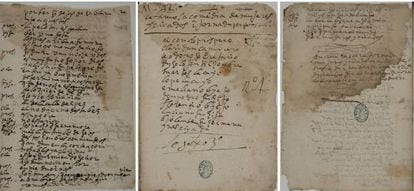Lost Lope de Vega play resurfaces
Prolific Golden Age playwright had included ‘Women and menservants’ on a list of his comedies But it had been gathering dust until 2010


All this time the manuscript had been sitting quietly among the shelves of the National Library in Madrid, covered by a thick layer of dust, right where someone had plopped it down some time in the late 19th century, it seems.
The discovery of Mujeres y criados (or, Women and menservants), a previously unknown comedy by Spanish playwright Lope de Vega (1562-1635), is proof that — amazing as it may sound — it is still possible to unearth a literary treasure from Spain's Golden Age of Letters, 400 years after it was written.
Lope scholars had given up all hope of ever finding the work, set in Madrid and written between 1613 and 1614, in the genius's glory days. But it was happened upon "randomly" in 2010 by Alejandro García-Reidy, a professor at Syracuse University and member of PROLOPE, a Lope de Vega research group at Barcelona's Autónoma University, during the course of an investigation into 16th- and 17th-century theater.
García-Reidy will publish his conclusions in the specialized journal Revista de Literatura. The Gredos publishing house plans to release the play in the spring, and by the fall of this year it will likely be staged again, four centuries after its creation.
But why wait more than three years before making the public announcement? According to the researcher, because of the usual time frames of analysis and attribution on the one hand, and of publication in the academic world in the other.
Amazing as it may sound, it is still possible to unearth a literary treasure from Spain's Golden Age of Letters
"I found a document from 1614 stating that a theater company of the era had bought a comedy from Lope called Mujeres y criados, and that it was being put on. I checked the catalogues, and it showed up as a text that had not been preserved. Then I checked the National Library, and saw there was a manuscript with that same name. I asked for the manuscript, a librarian brought it to me and I started working on the document," explains García-Reidy in a conversation from New York.
There was no doubt about it. The characteristics of both documents coincided, as did the poetic meter and the subject matter. There were other indications, such as the handwriting of the copyist, which pointed inexorably to Lope.
This particular copy was handwritten by Pedro de Valdés, director of the theater company putting on the play. The document is dated 1631, and nobody had connected the dots that led to Lope de Vega, who wrote a tremendous amount of comedies (he himself put the number at around 1,500). Lope included Mujeres y criados on his list of comedies that were genuinely his, published in the 1618 edition of El peregrino en su patria.
According to García-Reidy, it is "a high-quality piece that can compete with some of the best urban comedies from Lope's best years." In his opinion, Mujeres y criados still works today "because of the comical element, the uninhibited nature of his female characters, and the way he pokes fun at some of the social conventions of the day."
"An analysis of the meter adjusts perfectly to the uses of Lope de Vega around the years 1613 and 1614," he adds, to confirm that there is no doubt about the authorship.
The story takes place in Madrid and features two sisters, Violante and Luciana, and their suitors, Claridán and Teodoro. The two couples, whose love has been secret to date, find themselves in a tight spot after two more suitors show up: Count Próspero, who hankers after Luciana, and the wealthy Don Pedro, who is courting Violante. What ensues is a game of hide-and-seek and a comedy of errors.
"Lope wrote many plays, but finding those that are still missing is not easy," notes Alberto Blecua, director of PROLOPE. "Although attributions are subject to potential controversy, the prestige of the researcher and the solvency of his arguments allow us to predict that there is going to be near unanimous consensus among the research community about the real authorship in this case."










































